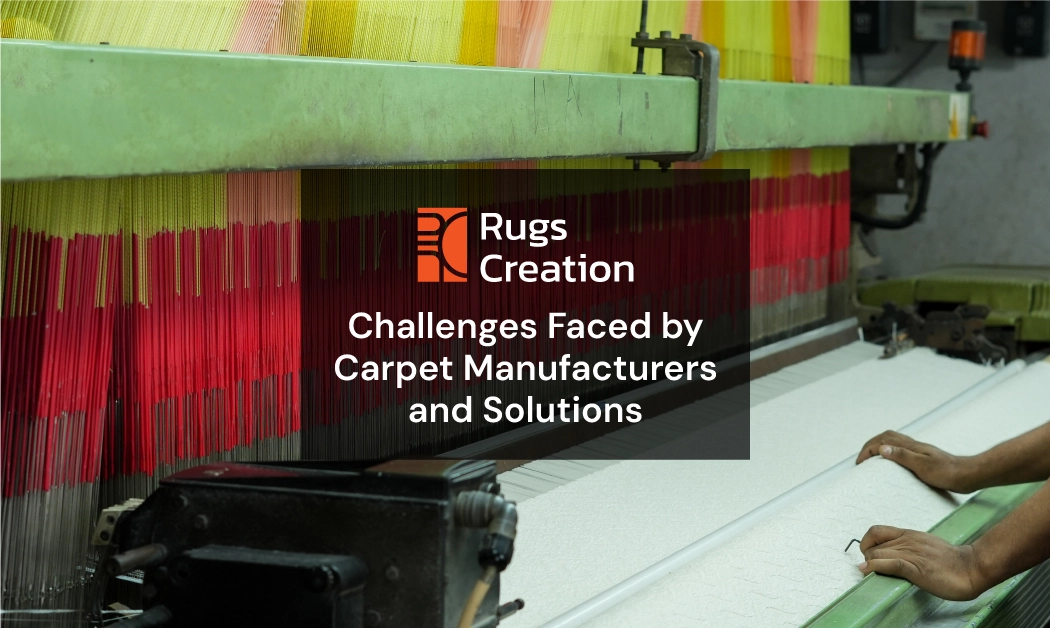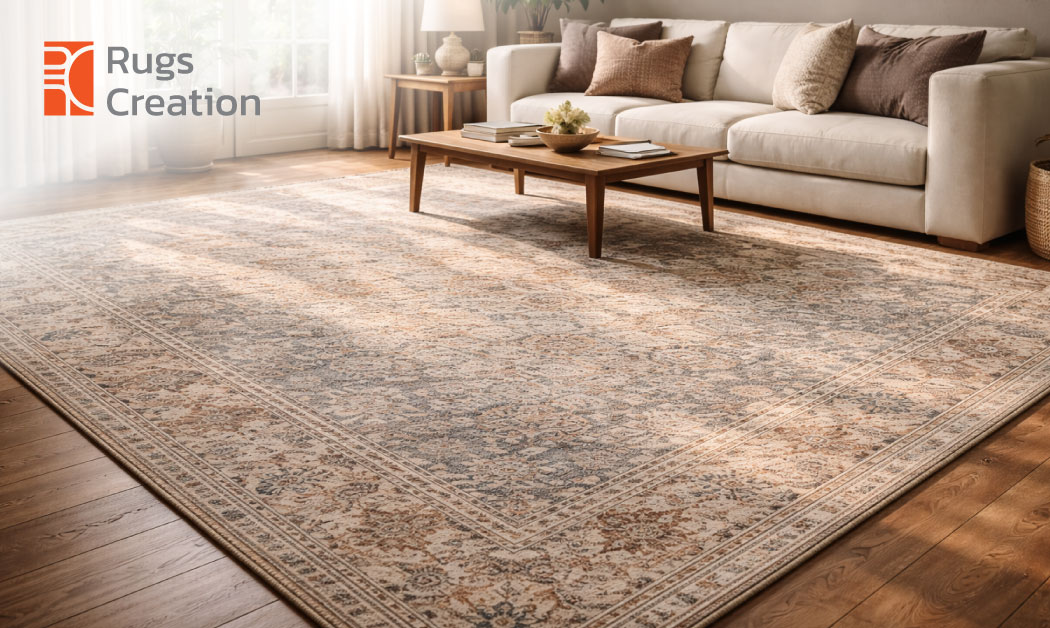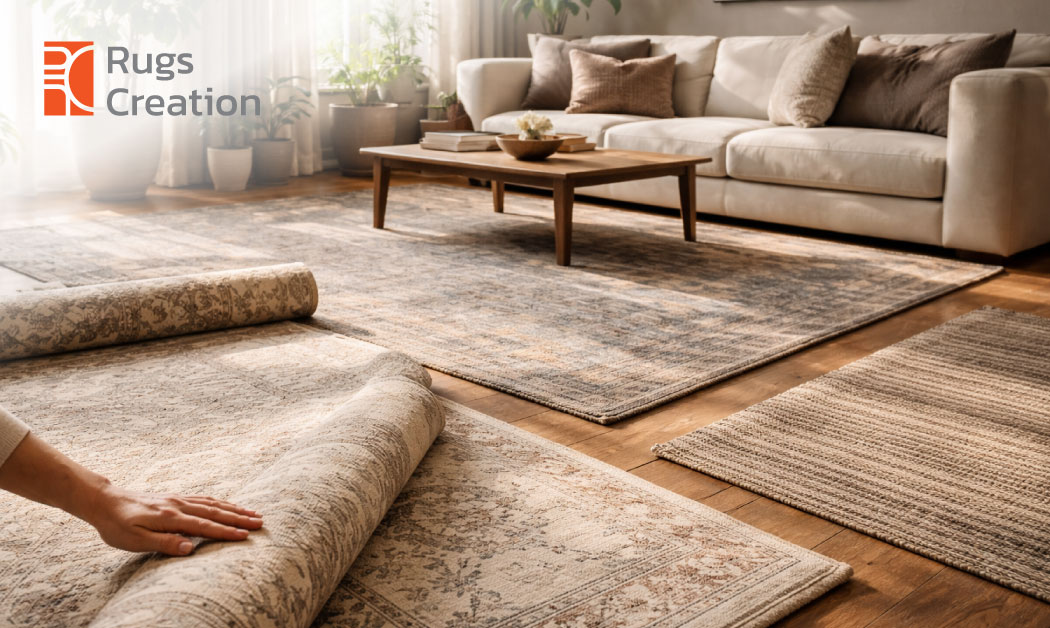Carpet manufacturers operate in a dynamic and competitive industry, facing numerous challenges that impact their ability to deliver high-quality products. Addressing these challenges requires strategic thinking and innovative solutions. In this article, we will explore the key challenges faced by carpet manufacturers and the effective strategies to overcome them.
Table of Contents
ToggleRaw Material Sourcing
Challenge:
Securing high-quality raw materials is a major challenge for carpet manufacturers. The availability and prices of raw materials such as wool, cotton, and synthetic fibers can fluctuate due to factors like seasonal variations, geopolitical issues, and market demand. This variability can affect the production schedule and cost structure.
Solution:
To mitigate these issues, carpet manufacturers in India should develop long-term relationships with reliable carpet suppliers. By establishing strong partnerships, manufacturers can ensure a steady supply of quality materials. Additionally, investing in sustainable raw materials can stabilize supply chains. For instance, using recycled fibers or sustainable wool not only ensures a consistent supply but also appeals to environmentally conscious consumers.
Quality Control
Challenge:
Maintaining consistent quality across large production runs is crucial yet challenging. Variations in raw materials, human error, and equipment malfunctions can lead to defects, impacting the overall quality of the finished product.
Solution:
Implementing rigorous quality control processes at every stage of production is essential. Carpet manufacturers should conduct regular inspections and use advanced technology to monitor production. Techniques such as automated quality checks and real-time data analytics can help detect defects early, ensuring that only high-quality products reach the market.
Labor Practices
Challenge:
Ensuring fair labor practices and good working conditions is a crucial aspect of ethical manufacturing. However, monitoring and maintaining these standards can be challenging, especially for manufacturers operating in regions with varying labor laws and standards.
Solution:
Establishing clear labor policies and conducting regular audits are essential steps. Carpet manufacturers should partner with organizations that promote fair labor standards and provide training programs to improve worker skills and job satisfaction. By prioritizing ethical labor practices, manufacturers can build a positive reputation and ensure compliance with international standards.
Technological Advancements
Challenge:
Keeping up with rapid technological advancements requires continuous investment and adaptation. New technologies can enhance production efficiency and product quality, but integrating these technologies can be costly and complex.
Solution:
Investing in modern manufacturing equipment and staying updated with industry trends is crucial. Carpet manufacturers should allocate resources for regular training programs to ensure that their staff can effectively use new technologies. This investment not only improves production efficiency but also ensures that the company remains competitive in the market.
Environmental Impact
Challenge:
The carpet manufacturing process can have a significant environmental footprint. From water and energy consumption to waste generation, the industry faces increasing pressure to adopt sustainable practices.
Solution:
Carpet manufacturers can adopt eco-friendly practices to minimize their environmental impact. This includes using sustainable materials, recycling waste, and reducing energy consumption. For example, using biodegradable dyes and implementing water recycling systems can significantly reduce environmental harm. Additionally, achieving certifications like Oeko-Tex can demonstrate a commitment to sustainability, enhancing the brand’s reputation.
Market Competition
Challenge:
The carpet industry is highly competitive, with many players offering similar products. Differentiating from competitors is essential to attract and retain customers.
Solution:
Differentiating through unique designs, superior quality, and excellent customer service can create a competitive edge. Carpet manufacturers can offer customization options, allowing customers to choose specific designs, colors, and sizes that suit their needs. Additionally, maintaining a strong online presence and engaging with customers through social media and other digital platforms can help build brand loyalty.
Meeting Consumer Preferences
Challenge:
Consumer preferences are constantly changing, influenced by trends, lifestyle changes, and cultural factors. Keeping up with these shifts can be challenging for carpet manufacturers.
Solution:
Conducting regular market research to understand emerging trends and consumer needs is essential. Carpet manufacturers should be flexible and responsive, offering a wide range of designs and customization options to meet diverse consumer demands. Engaging with customers through surveys, focus groups, and social media can provide valuable insights into their preferences.
Cost Management
Challenge:
Managing production costs while maintaining quality and sustainability is a constant challenge. Rising raw material costs, labor expenses, and energy prices can impact profitability.
Solution by Carpet Manufacturers:
Streamlining operations and optimizing resource use can help control costs. Carpet manufacturers should adopt lean manufacturing principles to eliminate waste and improve efficiency. Negotiating better terms with suppliers and investing in energy-efficient technologies can also reduce costs. Additionally, implementing cost-effective practices, such as just-in-time inventory management, can help balance production expenses with quality standards.
Conclusion
Carpet manufacturers face a range of challenges that require innovative solutions and strategic planning. By addressing issues related to raw material sourcing, quality control, environmental impact, labor practices, technological advancements, market competition, consumer preferences, and cost management, manufacturers can maintain high standards and remain competitive in the industry.
Rugs Creation, a leading carpet and cushion manufacturer in India, exemplifies these strategies through their commitment to quality, sustainability, and customer satisfaction. As a premier manufacturer in Panipat, Rugs Creation focuses on creating high-quality products while adhering to ethical and sustainable practices. By investing in modern technologies, adhering to ethical practices, and staying attuned to market trends, Rugs Creation continues to thrive despite the challenges faced by the industry.
For more insights into our manufacturing processes and products, visit Rugs Creation.



